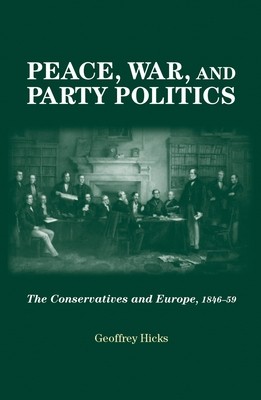
- We will send in 10–14 business days.
- Author: Geoffrey Hicks
- Publisher: Manchester University Press
- ISBN-10: 0719096669
- ISBN-13: 9780719096662
- Format: 15.6 x 23.4 x 1.5 cm, softcover
- Language: English
- SAVE -10% with code: EXTRA
Reviews
Description
Peace, war and party politics examines the mid-Victorian Conservative Party's significant but overlooked role in British foreign policy and in contemporary debate about Britain's relations with Europe.
The book considers the Conservatives' response DS in opposition and government DS to the tumultuous era of Napoleon III, the Crimean war and Italian unification. Within a clear chronological framework, it focuses on 'high' politics, and offers a detailed account of the party's foreign policy in government under its longest-serving but forgotten leader, the fourteenth Earl of Derby. It attaches equal significance to domestic politics, and incorporates a provocative new analysis of Disraeli's role in internal tussles over policy, illuminating the roots of the power struggle he would later win against Derby's son in the 1870s. Overall, it helps to provide us with a fuller picture of mid-Victorian Britain's engagement with the world. This book will be of use to those teaching and studying Victorian politics and foreign policy at all levels in higher education.EXTRA 10 % discount with code: EXTRA
The promotion ends in 7d.18:56:32
The discount code is valid when purchasing from 10 €. Discounts do not stack.
- Author: Geoffrey Hicks
- Publisher: Manchester University Press
- ISBN-10: 0719096669
- ISBN-13: 9780719096662
- Format: 15.6 x 23.4 x 1.5 cm, softcover
- Language: English English
Peace, war and party politics examines the mid-Victorian Conservative Party's significant but overlooked role in British foreign policy and in contemporary debate about Britain's relations with Europe.
The book considers the Conservatives' response DS in opposition and government DS to the tumultuous era of Napoleon III, the Crimean war and Italian unification. Within a clear chronological framework, it focuses on 'high' politics, and offers a detailed account of the party's foreign policy in government under its longest-serving but forgotten leader, the fourteenth Earl of Derby. It attaches equal significance to domestic politics, and incorporates a provocative new analysis of Disraeli's role in internal tussles over policy, illuminating the roots of the power struggle he would later win against Derby's son in the 1870s. Overall, it helps to provide us with a fuller picture of mid-Victorian Britain's engagement with the world. This book will be of use to those teaching and studying Victorian politics and foreign policy at all levels in higher education.

Reviews